Garden of Moldova (Gradina Moldovei)
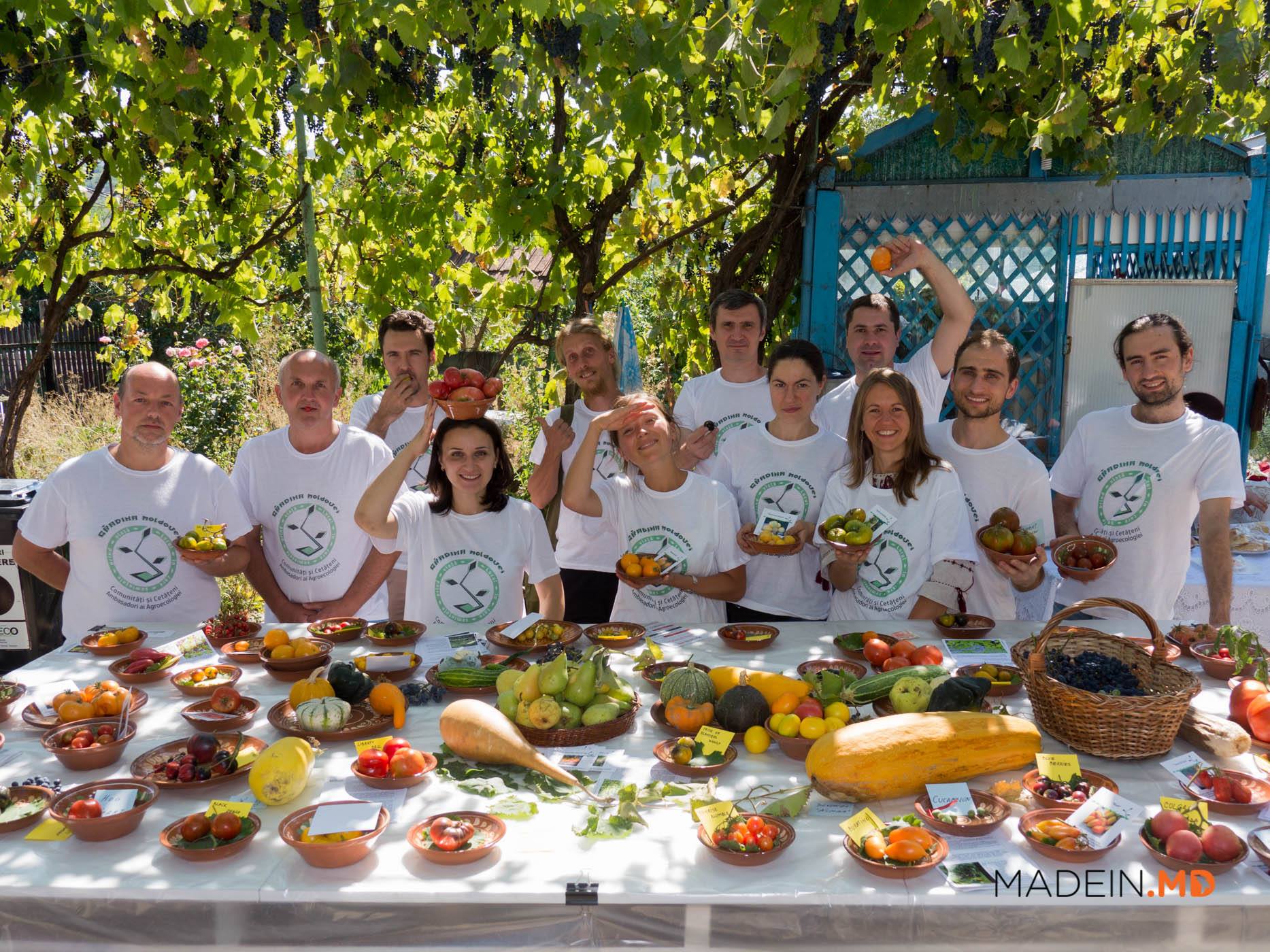
An NGO with an experimental garden offering training, workshops and events sharing the practices of agroecology and creating an open Moldovan seed bank.
Key words: Agroecology, seed bank
Short description
Name of the initiative? Garden of Moldova (Gradina Moldovei)
Country Republic of Moldova
Region Rn Ialoveni
What kind of initiative Farming/production, education/training, environmental, biodiversity, community
The Story
In Moldova, ‘Garden’ can have a double meaning: edible or decorative garden. I founded Garden of Moldova with my husband and some friends almost five years ago in October 2015, on the back of attending some workshops at an Eco Village. We organised several workshops arounds seeds and planting for people from the city (who were interested to move to the countryside or just to learn agriculture). Each seminar attracted more and more people, especially young people looking for alternative agriculture. We realised in Moldova we didn’t have a seed bank and most of our seeds come from abroad and can be very bad quality or from places with a very different environment from Moldova. So, we decided to create an NGO with an objective to create a seed bank open to every citizen as our only existing national one is just for scientific research.
“When my husband and I started the NGO, we were living in Chisinau in a flat without a garden. It seemed confusing we’d be speaking about agroecology and seeds from a place like that. “
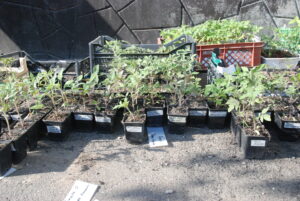 I’d lived as a landscape architect in Belgium for fifteen years. When I came back to Moldova seven years ago, I didn’t find a suitable job. When my husband and I started the NGO, we were living in Chisinau in a flat without a garden. It seemed confusing we’d be speaking about agroecology and seeds from a place like that. It took eight months to find a house.
I’d lived as a landscape architect in Belgium for fifteen years. When I came back to Moldova seven years ago, I didn’t find a suitable job. When my husband and I started the NGO, we were living in Chisinau in a flat without a garden. It seemed confusing we’d be speaking about agroecology and seeds from a place like that. It took eight months to find a house.
It was hard at the beginning – the administration of starting something new is very complicated in Moldova. It’s not transparent. You cannot find a website with an official procedure. I’d recommend taking advice from existing NGOs – several because sometimes you get contradictions. Thanks to an accountant friend and support from Eco Village we managed to navigate the process.
“…the administration of starting something new is very complicated in Moldova. It’s not transparent. You cannot find a website with an official procedure.”
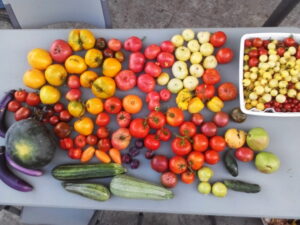 NGOs are subject to the same fees as businesses, and to start you need a little bit of money. We borrowed this money and slowly, thanks to donations, membership fees, selling seeds and so on we managed to pay back the money we’d borrowed for the administrative fees. Then we received some outside support. We are in good contact with Eco Ruralis in Romania. We visit each other for different events. I networked a bit in France, and we are part of the ‘Mouvement des Femmes Semencieres’. They gave us a special fridge to help us store seeds in safe conditions.
NGOs are subject to the same fees as businesses, and to start you need a little bit of money. We borrowed this money and slowly, thanks to donations, membership fees, selling seeds and so on we managed to pay back the money we’d borrowed for the administrative fees. Then we received some outside support. We are in good contact with Eco Ruralis in Romania. We visit each other for different events. I networked a bit in France, and we are part of the ‘Mouvement des Femmes Semencieres’. They gave us a special fridge to help us store seeds in safe conditions.
We had already made some video presentations but due to COVID-19 restrictions we have placed greater emphasis on these and they are watched in Moldova and Romania, but we are also finding they are watched by Moldovans who live all over the world, and they are telling their relatives who live in Moldova about us!
“Collaboration is a lot about communication. We use our garden as a visual platform to concretely show things growing better without the work and chemicals.”
Collaboration is a lot about communication. We use our garden as a visual platform to concretely show things growing better without the work and chemicals. This is one of the best ways to communicate this information to bring people in contact with the garden and where the seeds are grown.
“The food is one of the best arguments to convince and to bring people together.”
The food is one of the best arguments to convince and to bring people together. When we have been short of money but have extra seeds or seedlings or produce, we can give these as a small gift to those who help us. It opens the mind to new tastes and new vegetables. We’ve run a master class for collecting and cooking new vegetables that they’ve not experienced before.
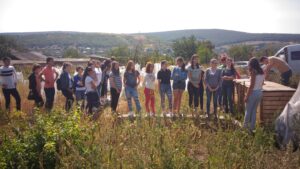 It was my decision not to take a salary, and I did as much as I could on my own, but we needed an accountant, once we started receiving grants. Then of course, you need to pay the accountant, and this was a challenge. Even if there hasn’t been much activity, grants or income, every three months we still have to submit a financial report.
It was my decision not to take a salary, and I did as much as I could on my own, but we needed an accountant, once we started receiving grants. Then of course, you need to pay the accountant, and this was a challenge. Even if there hasn’t been much activity, grants or income, every three months we still have to submit a financial report.
For us the NGO grew fairly organically. I don’t have a salary the main part of the year – just when we have a grant – but I’m happy we are not dependent on space we need to rent. This freedom is very important.
“…I’m happy we are not dependent on space we need to rent. This freedom is very important.”
The NGO operates out of our house and garden. The workshops and events take place there and the seed market we organise each spring is in our courtyard. This means we can offer all our events for free. My husband and I are the two pillars of Garden of Moldova. We have twelve members who help and support us. Other volunteers give their time to help with events.
“When we first moved to our house in a new village, we were considered foreigners and it was a huge work to integrate into our community.”
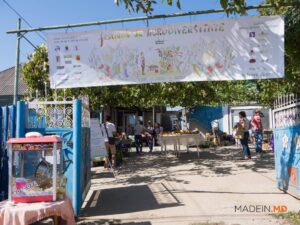 These five years have been very intense. When we first moved to our house in a new village, we were considered foreigners and it was a huge work to integrate into our community. We spent the first two years renovating. The garden needed regeneration. It was pretty exhausted. The weeds were higher than me and the villagers were laughing about our project. Slowly we were able to invest more. My husband was travelling to Chisinau for work each day, but after two years he got a job closer and was able to help more. The garden began to take shape and have structure and we had a lot of journalists interested in our way of agriculture and the seed bank. After seeing us on TV, our neighbours started to be proud of us. We have spent these years finding our place in the community. We organised a distribution of seeds and seedlings to in habitants of the village and they responded very well.
These five years have been very intense. When we first moved to our house in a new village, we were considered foreigners and it was a huge work to integrate into our community. We spent the first two years renovating. The garden needed regeneration. It was pretty exhausted. The weeds were higher than me and the villagers were laughing about our project. Slowly we were able to invest more. My husband was travelling to Chisinau for work each day, but after two years he got a job closer and was able to help more. The garden began to take shape and have structure and we had a lot of journalists interested in our way of agriculture and the seed bank. After seeing us on TV, our neighbours started to be proud of us. We have spent these years finding our place in the community. We organised a distribution of seeds and seedlings to in habitants of the village and they responded very well.
We’ve had almost 1000 visitors to our garden since we started and have 5000 followers on Facebook. This is very exciting for us.
Additional information
—
Repository compiled in August 2020 by: Mariana Seremet
E-mail contact: gradinamoldovei@gmail.com
Tag:agroecology, garden, seed bank, workshops
